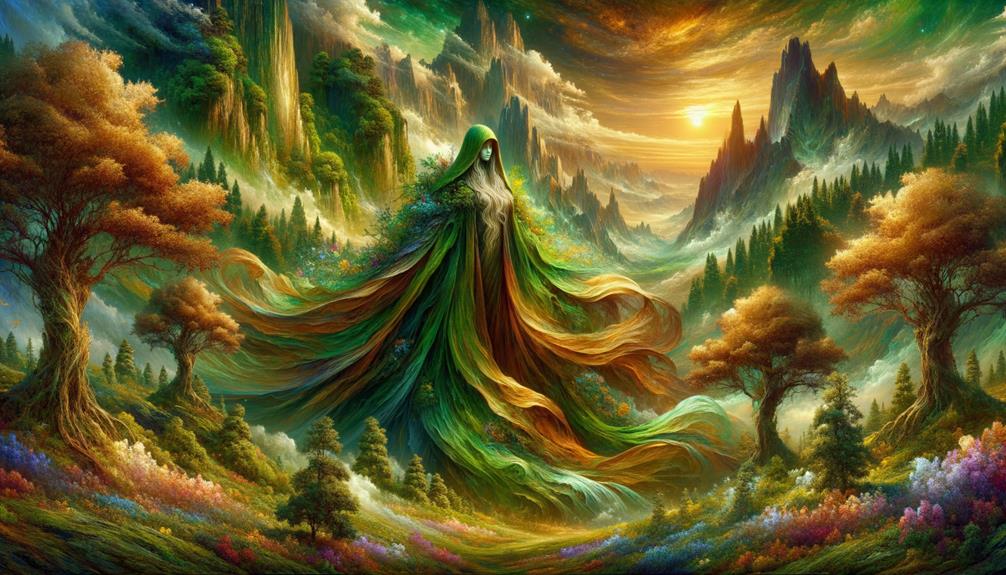Hou Tu epitomizes the enduring vitality of the earth, standing as its steadfast sovereign. She joined the Yellow Emperor's journey, restoring order and harmony through nature's cycles. As the Earthly Empress, Hou Tu fosters life's renewal, overseeing the rhythm of seasons. In spiritual practices, her grounding presence guides followers, reflecting the earth's constancy. Rituals honoring her forge a connection with the world's patterns, seeking her favor for abundance and refuge. Hou Tu's timeless quest intertwines wisdom and nature's generosity.
Early Mythology
From ancient Chinese folklore, the mythical figure Houtu emerged as a steadfast guardian of the land, joining the legendary Yellow Emperor Huang Di in shaping mountains to control raging floods. During a chaotic period when nature seemed unruly, Houtu exemplified the earth's strength and resilience.
Houtu's mission transcended mere earth-moving; it embodied a heroic quest to restore harmony to a world plagued by water's destructive force. The mountains he created stood as monuments to his unwavering spirit, declaring his commitment to safeguarding the land.
In the tale of the Yellow River, Houtu's guidance proved invaluable. He assisted Yu in properly channeling the river, preventing inundations and nurturing the soil. Through such deeds, Houtu became the living embodiment of Earth's nurturing and protective qualities. His enduring legend illustrates the archetype of the hero who triumphs over chaos, bringing order and life to a turbulent realm.
Role in Daoism
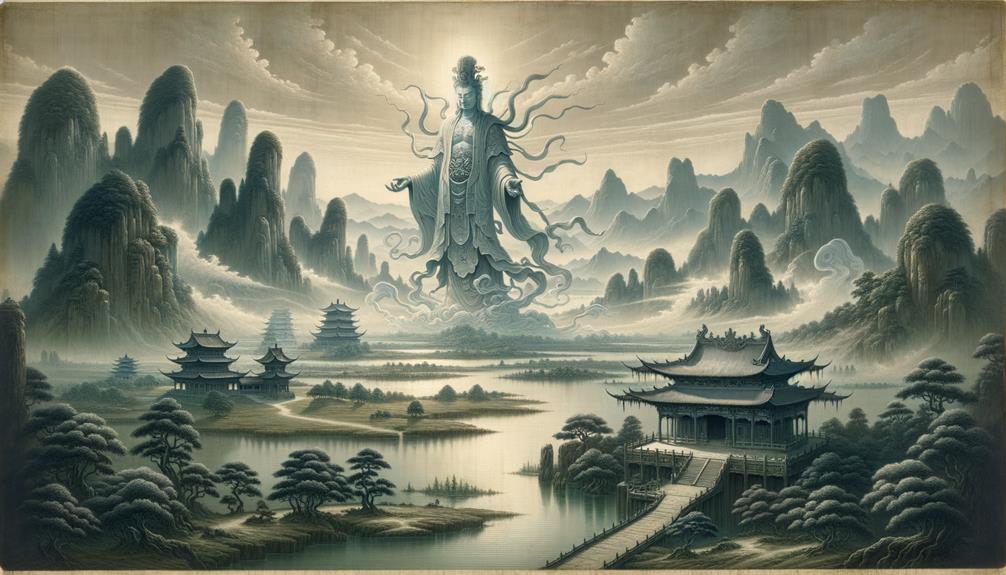
In the realm of Daoism, Houtu stands as the sacred protector of Earth, epitomizing yin's essence. Her presence is revered through rituals and offerings connecting us to fertile grounds and celestial realms. Within Taoist cosmology's intricate tapestry, she emerges as a potent archetype, harmonizing the universe's energies.
Sacred Earth Deity
Among the Taoist deities, Houtu symbolizes the earth's nurturing and fertile essence. This goddess embodies our connection to nature – soil, rivers, and mountains under her protection.
Taoism sees Houtu as one of the Four Heavenly Ministers overseeing earthly affairs. Her sacred mountain, Mount Jiuhua, draws pilgrims seeking fertility blessings. Honoring Houtu fulfills a spiritual need to commune with the earth's divine essence.
Houtu manages the cycles that sustain life, ensuring the land remains bountiful. As the archetypal Great Mother, her influence nurtures all life forms. In every grain of soil and raindrop, her presence grounds the spiritual world with the earthly realm.
Rituals and Offerings
Daoist ceremonies honor Houtu, the Earth Queen, through rituals connecting humanity with nature's abundance. Lighting incense, chanting scriptures, and offering vibrant fruits weave gratitude for the earth's fertility. These thoughtful gestures invoke Houtu's blessings upon lands and lives.
In this spiritual tradition, offerings hold profound symbolism beyond mere gestures. Incense purifies, candles guide, fruits represent prosperity, scriptures forge spiritual bonds, and meditation aligns us with nature. Through these sacred acts, prayers for abundance reverberate across fields, ensuring bountiful harvests. Each chant and gesture tightens our symbiotic relationship with the natural world.
Ritual Element Symbolic Meaning
Incense Purification, divine connection
Candles Illumination, guidance
Fruits Prosperity, bounty
Scriptures Spiritual bonds, invocations
Meditation Inner peace, nature harmony
Symbolic Representation
In Chinese mythology, Houtu occupies a revered position as the Empress of the Earth. As one of the Four Heavenly Ministers, her influence extends beyond governing the terrestrial domain to encompass fertility, rivers, mountains, and celestial bodies like the changing seasons. This dual role reflects the interconnectedness between the heavens and earth – a central belief in Chinese religious practices.
Daoist temples honor Houtu not just as a guardian of the earth but also as an overseer of sky deities. Her worship involves intricate rituals and offerings, underscoring the importance of maintaining cosmic harmony. Houtu symbolizes the delicate balance between celestial and earthly affairs, bridging the divine and mundane realms seamlessly.
Canadian journalists might describe Houtu's archetypal role as a poignant reminder of the unity that exists within the natural world. Her symbolic presence encapsulates the delicate dance between heaven and earth, a concept deeply rooted in traditional Chinese beliefs. The reverence for Houtu speaks to humanity's innate desire to find order and equilibrium in the cosmos.
Role in Buddhism
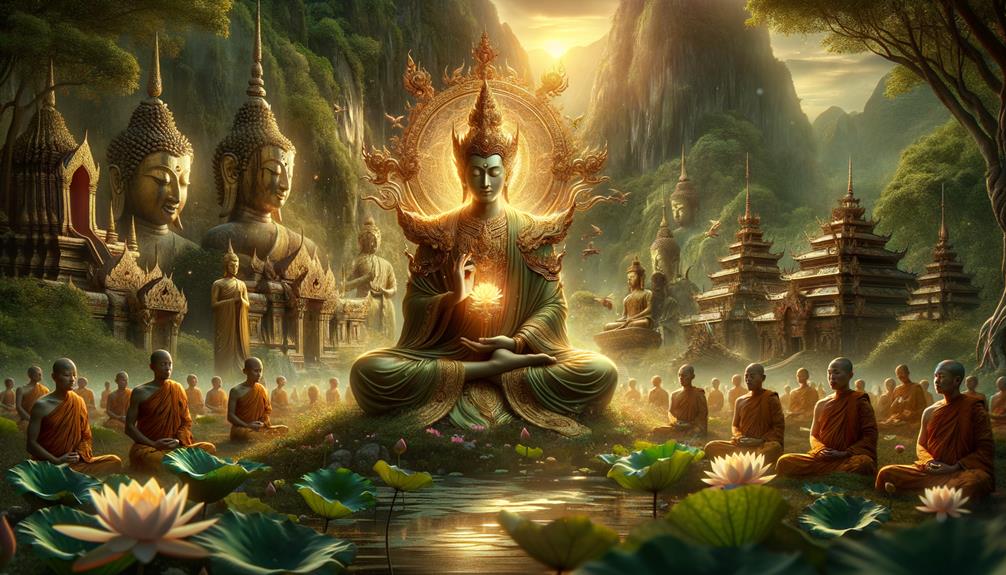
Houtu's representation as Earth mirrors the Buddhist goddess Bhumi, grounding spiritual beliefs in the tangible world. While seekers journey towards enlightenment, Houtu anchors them, reflecting Buddhism's connection to the physical realm. Her integration into both Taoist and Buddhist faiths exemplifies the harmonious blend of traditions enriching Chinese spirituality.
Houtu personifies the nurturing and stabilizing essence of the Earth, a constant amidst spiritual pursuits. Like a wise mentor, her archetype guides followers to remain rooted as they ascend philosophical heights. This melding of the earthly Houtu with reverence for the ground underscores the intertwined nature of all existence within these belief systems.
The seamless adoption of Houtu across diverse spiritual practices demonstrates the fluidity of Chinese religious traditions. Her symbolism as the Earth Mother unifies spiritual and cultural identities, a reminder of our fundamental bond with the natural world. As both paths converge in venerating Houtu, the depth of these ancient philosophies harmoniously coalesces.
Worship Practices
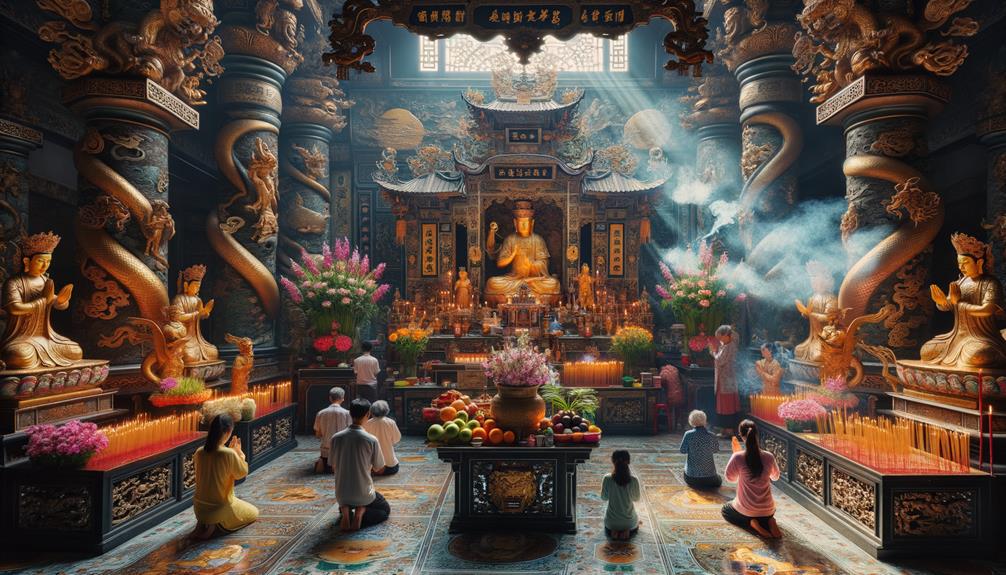
Standing before the altar of Hou Tu Nainai, I'm immersed in rituals and offerings that have endured for centuries. Sacred sites and seasonal celebrations interweave a devotional tapestry, connecting us to the earth's rhythms and life's cycles. Each gesture and incense stick honors the eternal bond between humanity and the soil's sovereign spirit.
Rituals and Offerings
Worshipers congregate, their souls filled with reverence, presenting pigs, chickens, rice, and wine at Hou Tu's sacred altar – Earth's Sovereign. These offerings symbolize life's abundance, thanksgiving, and humanity's eternal connection with the earth's nurturing spirit. While local deities may differ, Hou Tu remains the steadfast guardian of terrestrial domains.
Rituals commence with incense lighting, an aromatic bridge linking the earthly and divine realms. Worshipers bow deeply, their motions echoing ancestral traditions as prayers rise like whispers, seeking Hou Tu's favor and blessings. The altar, adorned with rice, wine, tea, and other foods, mirrors the agricultural cycle, emphasizing life's cyclical nature and sustenance.
| Offering | Symbolism |
|---|---|
| Pigs and Chickens | Prosperity and Life |
| Rice and Wine | Nourishment and Unity |
| Incense | Divine Communication |
| Flowers and Candles | Purity and Sincerity |
Each ritual element, from offerings to recitations, carries profound significance. Candles illuminate, their flames flickering like souls yearning for enlightenment, while flowers represent purity and devotion. Though regional practices may vary, the core essence of respect and gratitude towards Hou Tu persists, uniting worshipers in an ageless dance of reverence.
Sacred Ceremonial Sites
In Wanrong County, the Houtu Temple has been a sacred site for centuries, where worshippers honor the god of the Earth through age-old rituals. As I entered the grounds, a profound sense of history enveloped me – this place embodies the heritage and unity of the Chinese people.
The intricate carvings adorning the temple walls depict mythical tales, connecting visitors to Houtu's divine essence. Lush gardens surround the structure, representing the nurturing aspect of the Earth god and providing tranquil spaces for reflection. Inside, ancient altars stand as focal points for offerings, where incense and prayers rise heavenward.
Worship at Houtu Temple remains a cultural touchstone, uniting Chinese communities worldwide through reverence and shared memory. Each ritual performed here bridges the past and present in sacred harmony, an enduring journey steeped in tradition.
Seasonal Celebrations
Leaving the hallowed Houtu Temple grounds, I found myself immersed in a vibrant tapestry of seasonal celebrations honoring Hou Tu, the revered Earth deity. The air crackled with anticipation as communities gathered on auspicious lunar dates like March 18th to partake in grand rituals echoing ancient practices instituted by the legendary Yellow Emperor, a thread binding us through time.
These ceremonies paid homage to ancestors, a reminder of our roots. Prayers for fertility and prosperity rang out, seeking Hou Tu's blessings upon our fields and families. While rooted in China, these celebrations have transcended borders, uniting Chinese diaspora communities worldwide in shared reverence.
As offerings were presented and chants resonated, I saw the Yellow River not merely as a waterway, but a symbol of our cultural lifeblood, nourishing the earth that sustains us. From Han to Tang and Song dynasties, these rites evolved yet remained steadfast in purpose – a testament to the enduring spirit of Chinese civilization and the unity fostered by Hou Tu veneration.
Symbolism and Significance
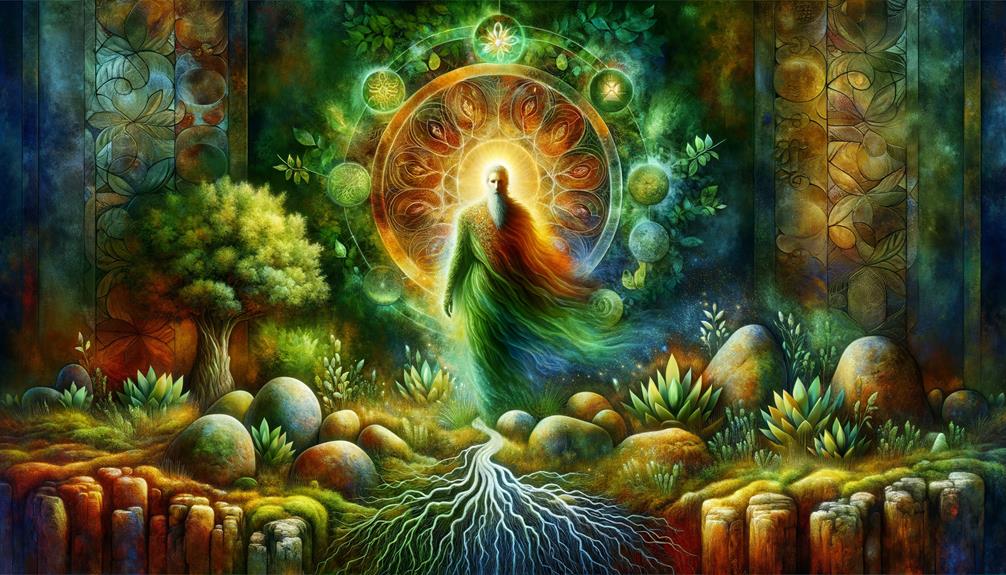
Houtu, the embodiment of the Earth element, stands tall as a powerful symbol weaved into Chinese mythology. As the Empress of the Earth, her presence goes beyond mere representation – she is the land itself, nurturing life and prosperity.
Imagine ripe golden fields under Houtu's watchful eye, each grain symbolizing abundance. Envision majestic landscapes rising and falling, echoing her strength. Picture rivers nourishing the earth, their paths mirroring Houtu's essence.
In ancient Chinese beliefs, Houtu guides the seasons' cycles and nature's delicate balance. One of Taoism's Four Heavenly Ministers, her influence bridges the divine and mortal realms, reminding us of life's interconnectedness with spirituality.
Houtu transcends tales, personifying the earth's renewal and life's eternal dance. As the fertile soil from which existence blossoms, she symbolizes growth and the cycles sustaining our world.
Rituals and Ceremonies
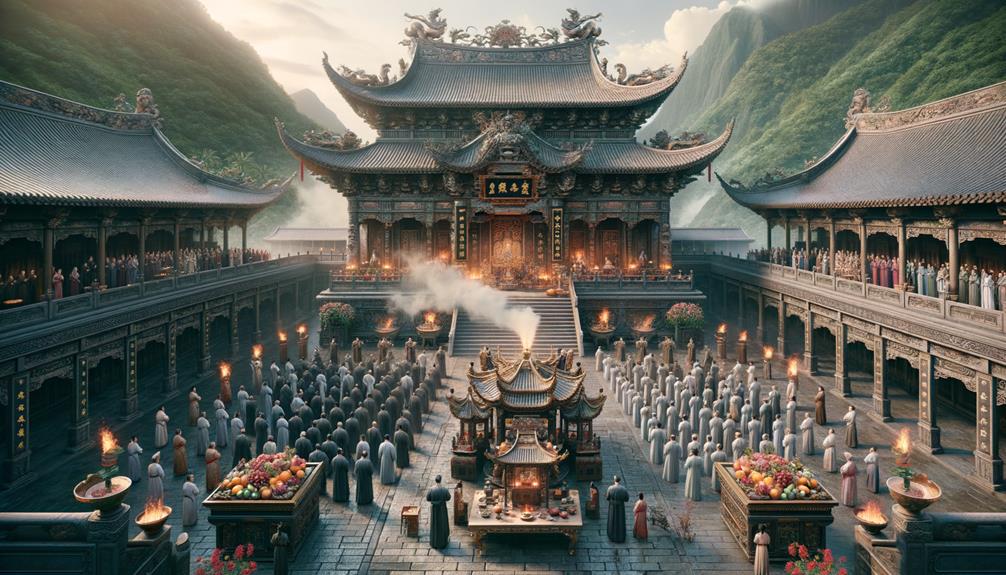
Rituals devoted to Houtu entwine offerings of fruits, grains, and incense, a sincere display of reverence. As the earth deity, Houtu holds a sacred space where worshippers perform deep bows, known as kowtows, showing unwavering dedication. The atmosphere thickens with the fragrance of burning incense and candlelight, bridging the mortal and divine realms.
Voices rise in unison, reciting prayers and mantras, beseeching Houtu for blessings and protection. This act transcends mere vocalization, becoming a spiritual journey where earthly concerns meet celestial guidance. Each word spoken carries profound meaning, seeking favor from the earth's sovereign protector.
Miniature houses, animals, and crops are laid before Houtu, their symbolism resonating deeply. These items represent prosperity, stability, and the nurturing essence of the soil. Through these rituals, worshippers forge an enduring connection with Houtu, honoring the timeless bond between humanity and the fertile earth.
Frequently Asked Questions
Who Is the Chinese God of the Earth?
In Chinese mythology, Houtu embodies the Earth's spirit as its guardian deity. Representing stability and the essence of life itself, Houtu nurtures the natural world.
Is the Chinese Dragon a God?
The Chinese dragon epitomizes power, strength, and fortune. Revered like a wise sage, it commands the elements, guiding heroes' journeys and symbolizing good luck within myths and legends. Far from a deity, the dragon embodies desirable qualities in Chinese culture, inspiring awe and respect.
Who Is the Mother Earth in Chinese Mythology?
In Chinese mythology, Houtu represents Mother Earth – the nurturing force behind nature's abundance. Her spirit grounds all life, embodying balance and fertility. As the deity overseeing land and soil, she provides sustenance and growth.
This pragmatic portrayal reflects Houtu's significance in traditional beliefs. Her presence ensures harmony between humans and the environment they depend upon. The goddess personifies the cyclical rhythms of planting, harvest, and renewal that have guided agricultural societies for centuries. Reverence for Houtu continues to shape cultural values around respecting the Earth's provisions.
What Is the Meaning of Long Wang?
Long Wang, or the 'Dragon King,' embodies a revered deity in Chinese mythology. This powerful figure governs water, weather, and marine life, safeguarding sailors and maritime treasures. As a guardian of the seas, Long Wang ensures prosperity and safety for seafarers.

